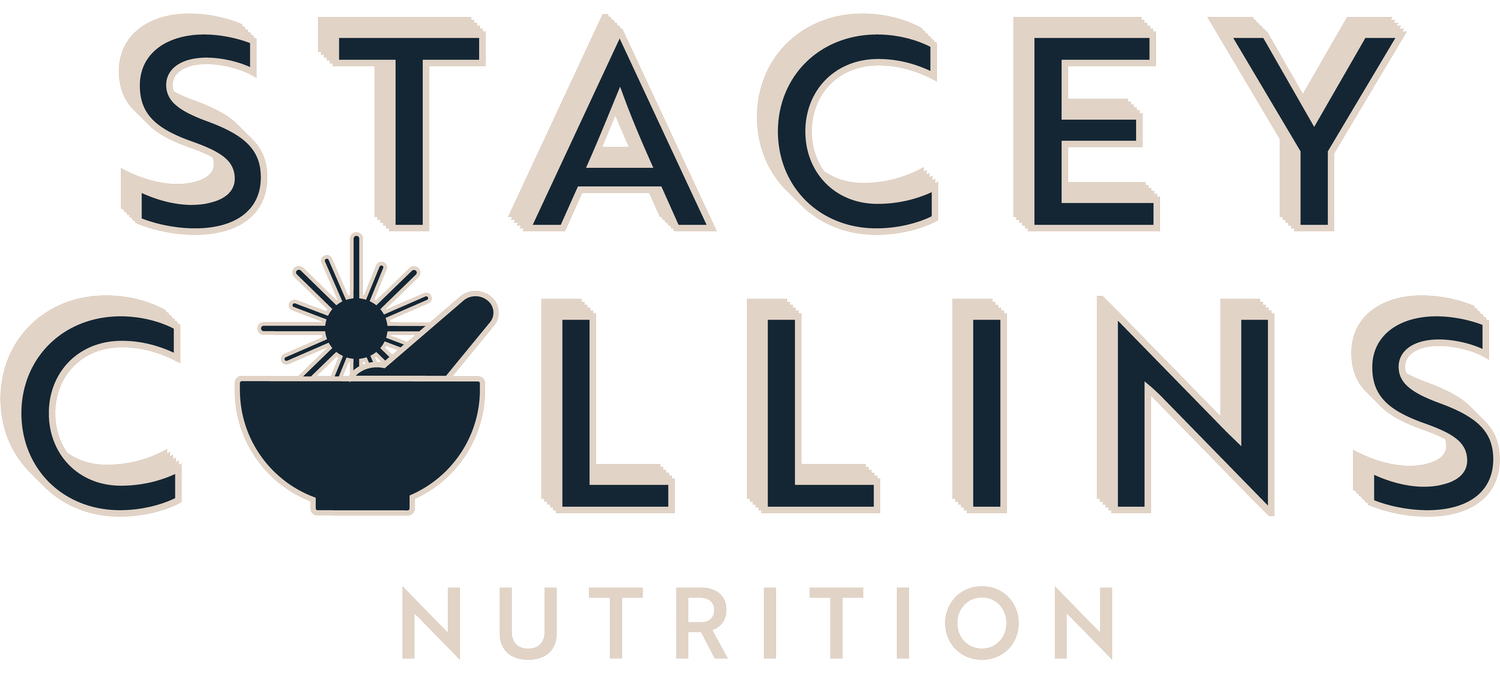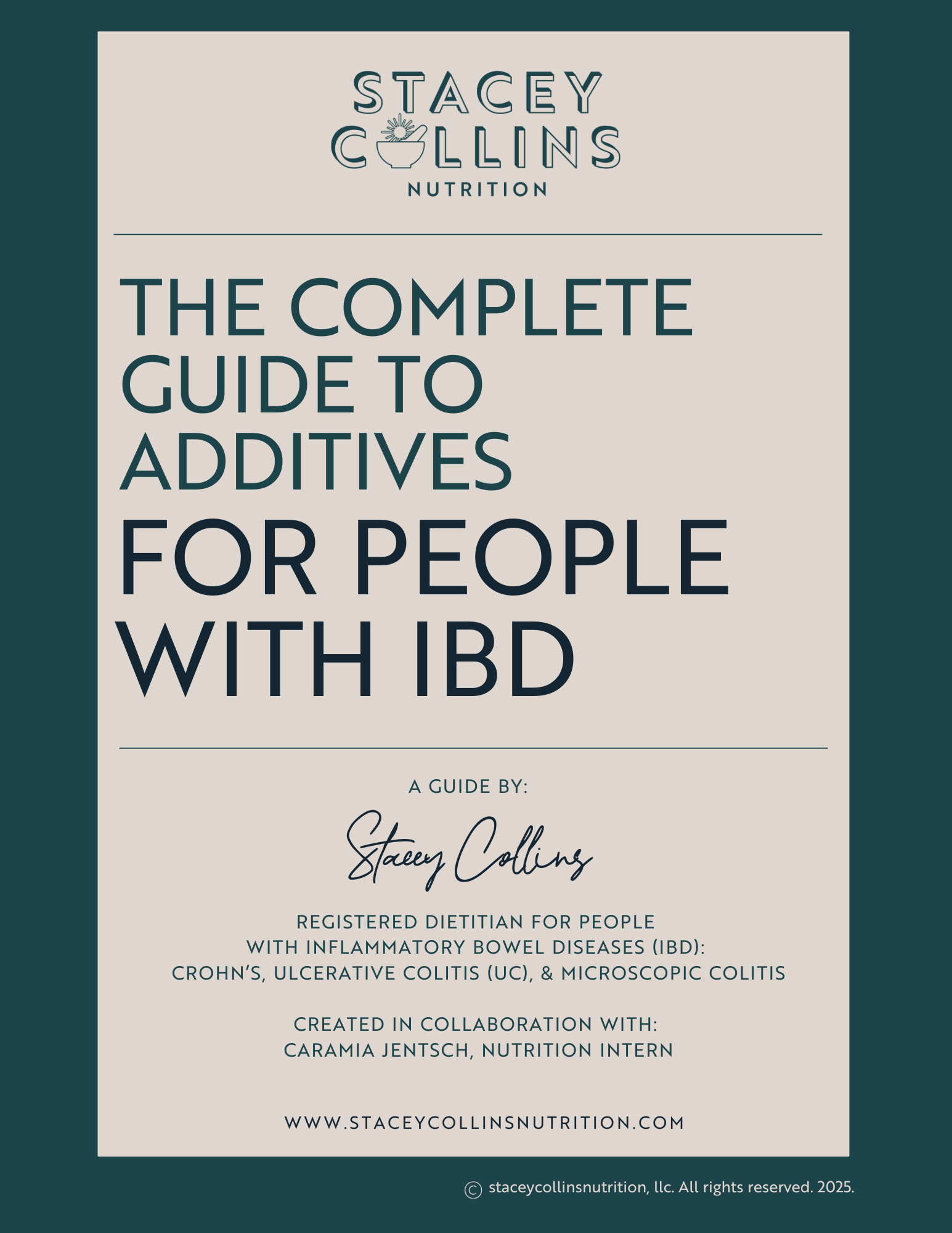Could the additives in your food be stirring up inflammation? New research suggests that certain emulsifiers and sweeteners might influence gut bacteria and immune responses in people with IBD—while others appear harmless or even helpful. Here’s what the latest studies reveal and how small, smart swaps could support your gut.
Do Food Additives Play a Role in IBD? Insights from New Studies
In Part 1 of this series, we looked at what really causes inflammation in inflammatory bowel disease (IBD). If you live with IBD, you’ve probably wondered if something you ate caused it or made your symptoms worse. First, it’s important to say this clearly: you did not cause your IBD.
IBD comes from a “perfect storm” of factors—genes, environment, immune responses, and gut bacteria all working together in complex ways. Food is just one part of the picture, but it’s also one of the pieces you have the most control over.
That’s why researchers have been looking closely at food additives. Additives are used to make food taste better, last longer, or keep its texture. Some are harmless (even beneficial), but others—especially certain emulsifiers—are being studied for their potential role in gut inflammation.
This article breaks down what the research actually says, highlights two important human studies, and clears up some myths about food additives and IBD.
Table of Contents
What Do Studies Say About Food Additives and IBD?
Over the years, plenty of lab and animal studies have suggested that certain food additives might affect the gut by disrupting bacteria balance, weakening the intestinal lining, or even triggering low-grade inflammation. But until recently, human studies were limited.
Two important studies now give us more insight:
The ENIGMA Study (2023)
This was one of the first large human studies to look at how emulsifiers affect people with Crohn’s disease.
Researchers focused on common emulsifiers like carboxymethylcellulose, polysorbate 80, carrageenan, maltodextrin, xanthan gum, and titanium dioxide.
They found that higher intake of these additives was linked to:
Shifts in the gut microbiota (less “good” bacteria, more “inflammatory” species)
A weaker intestinal barrier
Higher levels of inflammation markers
These results mirrored what scientists had already seen in animal models—suggesting these additives may indeed worsen gut inflammation.
Takeaway: The ENIGMA study showed that emulsifiers can change gut bacteria, compromise the gut lining, and increase inflammation in Crohn’s disease.
The ADDapt Trial (2025)
This was a randomized controlled trial (the “gold standard” in research) involving 154 people with mild to moderate Crohn’s disease.
Participants followed a low-emulsifier diet for 8 weeks, guided by a dietitian.
Results showed that:
Almost half of those on the low-emulsifier diet had major improvements in their disease activity scores, compared to only about 30% in the control group.
People were more than twice as likely to go into remission on the low-emulsifier diet.
Inflammation markers (like fecal calprotectin) dropped significantly.
Importantly, patients were able to stick with the diet—showing that this type of approach is realistic, not just theoretical.
Takeaway: Cutting back on certain food additives (especially emulsifiers) may help some people with Crohn’s disease feel better and reduce inflammation.
Why These Studies Matter
These studies, while they suggest some additives may increase risk for IBD, do not mean that food additives are the one and only cause of IBD. But they do suggest that, if you already have Crohn’s or ulcerative colitis, or if you are a first-degree relative of someone with IBD, paying attention to certain additives might support your gut microbiome health. If this feels overwhelming, know that you are not alone in figuring everything out. Working with a dietitian can help you make safe swaps without feeling restricted or defeated.
Why Do Foods Have Additives?
When you hear the word additives, it’s easy to think of them as something scary or “unnatural.” But the truth is, not all additives are harmful, and many play an important role in keeping our food safe and enjoyable.
Food additives can:
Preserve freshness so food doesn’t spoil too quickly.
Improve texture (like keeping ice cream creamy or salad dressing smooth).
Enhance flavor or color to make food more appealing.
Extend shelf-life so food can safely make its way from the store to your kitchen (especially important for those experiencing food insecurity or living in food deserts).
For many people, additives help make food more affordable, accessible, and consistent. And while some additives are being studied for their possible role in IBD, others have been shown to be safe, and in some cases, even potentially helpful.
Here’s the key point: Additives aren’t all “bad” or “good.” They exist on a spectrum. What matters most is which ones you’re consuming and in what amounts.
Which Additives May Be Less Harmful?
Not every additive is linked to gut inflammation. In fact, some appear to have little effect—or may even offer benefits. Here are two that researchers have looked at more closely:
Soy Lecithin
A common emulsifier found in products like chocolate, baked goods, and supplements.
In lab studies, soy lecithin caused smaller changes in gut bacteria compared to other emulsifiers.
Interestingly, some “good” bacteria decreased, while less healthy species increased slightly—but the effects were much weaker than additives like carrageenan or polysorbate 80.
Early research in mice models suggests soy lecithin might even have protective effects in ulcerative colitis, though strong human studies are still lacking.
Takeaway: For people with IBD, soy lecithin appears less concerning than other emulsifiers. Still, its long-term impact isn’t fully understood.
Baking Soda (Sodium Bicarbonate)
Best known as a pantry staple and toothpaste ingredient.
Limited research suggests that, when taken by mouth, baking soda may help activate the body’s natural inflammation-control system (called the “inflammatory reflex”). Scientists are still exploring the role of sodium bicarbonate to gain more understanding in this area.
Takeaway: Baking soda hasn’t been linked to gut harm in human studies and may even hold potential benefits, though it’s too early to say for sure.
Why This Matters
Hearing that “additives” may fuel inflammation can feel scary, but it’s not a one-size-fits-all story. Some additives are much less worrisome, and it’s not realistic—or necessary—to avoid everything with an additive on the label.
Food Additives and IBD: What the Research Shows
Below is a summary of common food additives, how they may affect inflammation in IBD, the strength of current evidence, and whether they were studied in the ADDapt or ENIGMA trials.
| Additive name | Route(s) of inflammation for IBD | Strength of evidence | Studied in ADDapt? | Studied in ENIGMA? |
|---|---|---|---|---|
| Carboxymethylcellulose (CMC) — soluble fiber / emulsifier | ✔ Intestinal permeability & mucus erosion ✔ Microbiome disruption & encroachment ✔ Immune activation |
Moderate — human feeding trial + strong animal data. | Yes | Yes |
| Polysorbate 80 (P80) — synthetic emulsifier | ✔ Intestinal permeability (mucus thinning) ✔ Microbiome disruption (pro-inflammatory shifts) ✔ Immune activation |
Moderate — strong animal + in-vitro; limited human data. | Yes | Yes |
| Carrageenan (E407) — seaweed-derived thickener | ✔ Intestinal epithelial pro-inflammatory effects / immune activation ✔ Mucus erosion (less consistent) |
Moderate — limited human (UC relapse); mechanistic support from cell/animal work. | Yes | Yes |
| Maltodextrin (MDX) — starch-derived polysaccharide | ✔ Direct permeability changes (mixed) ✔ Microbiome dysbiosis ✔ Mucus barrier impairment / ↓ antibacterial responses |
Limited → Moderate — mostly preclinical with plausible mechanism. | No | Yes |
| Titanium dioxide (TiO₂) — whitening/colorant / nanoparticle | ✔ Particle uptake in Peyer’s patches / immune activation ✔ Intestinal permeability alterations (animal models) ✔ Microbiome disruption (some evidence) |
Limited → Moderate — mechanistic concerns; found in human gut tissue. | No | Yes |
| Saccharin — artificial sweetener | ✔ Intestinal permeability (uncertain) ✔ Microbiome disruption ✔ Immune activation (animal models) |
Limited → Moderate — ENIGMA showed bacterial shifts; animal data support dysbiosis. | No | Yes |
| Sucralose — artificial sweetener | ✔ Intestinal permeability (mixed) ✔ Microbiome disruption ✔ Immune activation |
Limited → Moderate — ENIGMA + animal models suggest dysbiosis; minimal controlled human data. | No | Yes |
| Soy lecithin — emulsifier from soy (~30%+ phosphatidylcholine) | ✔ Intestinal permeability ✔ Microbiome disruption ✔ Immune activation |
Limited human; some evidence of benefit in UC (symptom + endoscopic). | No | No |
| Sodium bicarbonate — pH buffer / leavening agent | ✔ Intestinal permeability ✔ Microbiome disruption ✔ Immune activation |
Strong evidence of safety — no pro-inflammatory mechanism; used without IBD flare association. | No | No |
| Aspartame — artificial sweetener | ✔ Intestinal permeability (weak) ✔ Microbiome disruption (some models) ✔ Immune activation |
Limited — ENIGMA showed modest microbiota shifts; inconsistent human data. | No | Yes |
| Xanthan gum — bacterial polysaccharide thickener | ✔ Intestinal permeability (inconsistent) ✔ Microbiome modulation (composition/function changes) ✔ Immune activation (inconsistent) |
Limited — context dependent; sometimes neutral/beneficial. | No | Yes |
| Sodium sulfite — preservative | ✔ Oxidative stress potential ✔ Microbiome disruption (in vitro) ✔ Direct permeability effects (not well studied) |
Limited — ENIGMA found bacterial shifts; better known for asthma sensitivity. | No | Yes |
| Aluminum silicate — anticaking agent | ✔ Intestinal permeability (unclear) ✔ Environmental exposure / immune activation (cell studies) ✔ Microbiome disruption (minimal evidence) |
Limited — ENIGMA found bacterial effects; little human dietary data. | No | Yes |
Key Takeaways
You didn’t cause your IBD. Food is one part of a much bigger picture that includes genetics, the immune system, environment, and the microbiome.
Not all additives are the same. Some (especially certain emulsifiers) may aggravate gut inflammation; others appear safe.
Human data is growing, but still limited. The ENIGMA (2023) and ADDapt (2025) studies suggest that reducing emulsifiers can help some people with Crohn’s—yet this doesn’t mean additives cause IBD.
Small, targeted changes beat all-or-nothing diets. Focus on the few additives with the strongest evidence to reduce exposure rather than cutting every packaged food. Better yet, focus on including whole foods cooked at home, which are naturally low or absent in additives.
Your tolerance is personal. Two people with the same diagnosis can respond differently. Take inventory of your own signals (symptoms, stools, energy) when you make changes.
Get support. A dietitian can help you swap products, keep nutrition balanced, and avoid unnecessary restrictions.
Your Gut, Your Food, Your Next Step
In the next article, we’ll unpack processed foods and IBD—what “processed” actually means, how different levels of processing affect the gut, and realistic ways to shop and cook without spending your whole weekend in the kitchen.
Helpful Resource
Want a deeper dive into which additives to watch for, where they hide on labels, and easy product swaps/recipes? Grab my dietitian-vetted guide with practical replacement ideas and pantry shortcuts.
References
Raoul P, Cintoni M, Palombaro M, et al. Food Additives, a Key Environmental Factor in the Development of IBD through Gut Dysbiosis. Microorganisms. 2022;10(1):167. Published 2022 Jan 13. doi:10.3390/microorganisms10010167
Miclotte L, de Paepe E, et al. Long term exposure of human gut microbiota with high and low emulsifier sensitivity to soy lecithin in M-SHIME model. bioRxiv. 2021. Preprint. doi:10.1101/2021.12.16.472798
Stremmel W, Gauss A. Lecithin as a therapeutic agent in ulcerative colitis. Dig Dis. 2013;31(3-4):388-390. doi:10.1159/000354707
Naimi S, Viennois E, Gewirtz AT, Chassaing B. Direct impact of commonly used dietary emulsifiers on human gut microbiota. Microbiome. 2021;9(1):66. doi:10.1186/s40168-020-00996-6.
Alvarez MR, Mannon EC. Can a basic solution activate the inflammatory reflex? A review of potential mechanisms, opportunities, and challenges. Pharmacol Res. 2022;106525. doi:10.1016/j.phrs.2022.106525.
Trakman GL, Lin WYY, Hamilton AL, et al. Processed Food as a Risk Factor for the Development and Perpetuation of Crohn's Disease-The ENIGMA Study. Nutrients. 2022;14(17):3627. Published 2022 Sep 2. doi:10.3390/nu14173627
Bancil A, Rossi M, Sandall A, et al. DOP097 Emulsifier restriction is an effective therapy for active Crohn's disease: the ADDapt trial. J Crohn's Colitis. 2025;19(Suppl 1):i262.


